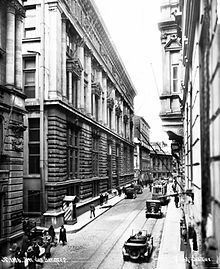Bankalar Caddesi
| Location | Turkey |
|---|

Bankalar Caddesi (Banks Street), also known as Voyvoda Caddesi (Voivode Street), in the historic Galata quarter (present-day Karaköy) of the district of Beyoğlu (Pera) in Istanbul, Turkey, was the financial centre of the late Ottoman Empire. It strikes out west from busy Kemeraltı Caddesi in Karaköy and segues into Okçu Musa Caddesi which leads up to Şişhane and Tepebaşı in Beyoğlu.
Although most of the grand 19th-century buildings that line both sides of the street have survived into the 21st century, they are increasingly being converted into hotels, restaurants and cultural centres.
The southern stop of Tünel (1875), the world's second oldest subterranean railway line after London's Underground (1863), is just minutes' walk away from the eastern end of Bankalar Caddesi. The Karaköy tram stop on the T1 line is also very close to the start of the street.
History
The street's name is Voyvoda Yolu (Voivode Road) mentioned in the 17th-century Seyahatnâme of Ottoman Turkish traveller Evliya Çelebi.[1]
During the late Ottoman period, the most important banks, financial institutions and insurance companies had their headquarters here.

These institutions included the
Bankalar Caddesi continued to serve as Istanbul's main financial district until the 1990s, when Turkish banks began moving their headquarters to the modern central business districts of Levent and Maslak. In the final decades of the 20th century, the Istanbul Stock Exchange moved first to the 4th Vakıf Han building in Sirkeci, and then in 1995 to its current building in İstinye.[5]
Attractions

The

The Camondo Steps, a curvaceous staircase designed in a unique mix of the Neo-Baroque and early Art Nouveau styles, and built in circa 1870–1880 by the renowned Ottoman-Venetian Jewish banker Abraham Salomon Camondo, links Bankalar Caddesi with Kart Çınar Sokak.[7] It was famously photographed by Henri Cartier-Bresson in 1964[8] and features in Barbara Nadel's crime novel, Pretty Dead Things.[9]

At the top of the steps on the road running parallel with Bankalar Caddesi are a couple of reminders of the time in the 14th century when this part of Beyoğlu was governed by the Genoese. The most important is the battered relic of the historic Genoese Palazzo del Comune (1314),[10][11][12][13] built by Montano De Marini,[14] the Podestà of Galata, and modeled after the 13th century wing of the Palazzo San Giorgio in Genoa, Italy.[15][16][17] It is a short walk to the left (west) of the Camondo Steps, along what was once the Rue Camondo and is now Kart Çınar Sokak.[18] In 2022 the building was put up for sale after years of neglect.[17][19]
Most of the buildings along Bankalar Caddesi have magnificent 19th-century facades that are being speedily renovated in the service of tourism at the start of the 21st century. The most comprehensive survey of these buildings was carried out for an exhibition in 2000 and the information was published in a comprehensively illustrated book called Bankalar Caddesi: Voyvoda Street from Ottoman Times to Today, edited by historian Edhem Eldem.[20]
Gallery
-
Camondo Stairs at Bankalar Caddesi
-
Bankalar Caddesi, detail at No. 9 (Assicurazioni Generali Office Building)
-
Bankalar Caddesi, detail at No. 11 (Ottoman Central Bank Building)
-
Minerva Office Building at the entrance of Bankalar Caddesi
References and notes
- ^ "Voyvoda Caddesi tarihini buldu". Hürriyet. 25 October 2000.
- ^ "Ottoman Bank Museum: History of the Ottoman Bank". Obarsiv.com. Archived from the original on 2012-06-14. Retrieved 2012-12-23.
- ^ "Milestones in Borsa Istanbul History". borsaistanbul.com. Retrieved 1 August 2022.
- ^ "Timeline of Borsa Istanbul". borsaistanbul.com. Retrieved 1 August 2022.
- ^ "Istanbul Stock Exchange: "İMKB'nin Kuruluşundan İtibaren Önemli Gelişmeler" (Timeline of important events since 1985)". Imkb.gov.tr. Archived from the original on 2012-02-25. Retrieved 2012-12-23.
- ^ "SALT | Kültür, Sanat ve Araştırma Kurumu". saltonline.org. Retrieved 2022-07-18.
- ^ "Camondo Steps on Bankalar Caddesi". Panoramikistanbul.com. 2009-12-15. Archived from the original on 2011-09-03. Retrieved 2012-12-23.
- ^ "Camondo Stairs of Galata". istanbul travelogue. Retrieved 2022-07-18.
- ISBN 9780755335619.
- ^ Historic sketch of the Genoese Palace (Palazzo del Comune, 1314) in Galata
- ^ Historic sketch of the Genoese Palace (Palazzo del Comune, 1314) in Galata
- ^ Historic photo of the Genoese Palace (Palazzo del Comune, 1314) in Galata
- ^ Historic photo of the Genoese Palace (Palazzo del Comune, 1314) in Galata
- ^ "Mural Slabs from Genoese Galata". www.thebyzantinelegacy.com. Retrieved 8 September 2023.
- ^ 13th century wing of the Palazzo San Giorgio in Genoa, Italy
- ^ Ruins of the Genoese Palace (Podesta Sarayı) in Galata, Istanbul, and the 13th century wing of the Palazzo San Giorgio in Genoa, Italy
- ^ a b "Galata'daki tarihi Podesta Sarayı satışa çıkarıldı". haber7.com. 18 July 2022.
- ^ Ottoman Bank Museum: Bereket Han on Bankalar Caddesi Archived April 10, 2009, at the Wayback Machine
- ^ "Tarihi Podesta Sarayı 7 milyon dolara satışa çıkarıldı". gazeteduvar.com.tr (in Turkish). Gazete Duvar. 2022-07-17. Retrieved 2022-07-18.
- ISBN 9759369206.
External links
- Ottoman Bank Museum: Database of the buildings on Bankalar Caddesi. Click on a building's image for detailed information.
- Ottoman Bank Museum: Panoramic view of the buildings on Bankalar Caddesi.
- Ottoman Bank Museum: History of the Ottoman Bank.
- Istanbul Stock Exchange: History of the Istanbul Stock Exchange.




